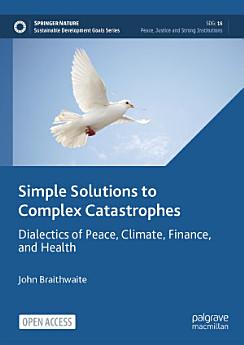Simple Solutions to Complex Catastrophes: Dialectics of Peace, Climate, Finance, and Health
About this ebook
Braithwaite argues that improved peacemaking, and step by step progress toward abolition of Weapons of Mass Destruction helps prevent environmental, pandemic, and financial catastrophes. His method across four kinds of crises is first to prioritize simple principles and simple institutions that prevent coupled catastrophes from cascading one to the other. The next step is to pursue requisite variety in responses by diagnosing dialectically when additional interventions will and will not add value for crisis control. Braithwaite argues that minimal sufficiency of deterrence, responsive regulation of risks, and restorative diplomacy offer superior theoretical foundations than realism in international relations theory and in organizational crime control. It speaks to those interested in criminology, public policy and international relations, political science, sociology, public health and economics.
About the author
John Braithwaite is an Emeritus Distinguished Professor of the Australian National University, and an interdisciplinary scholar of peacebuilding, war crime, business crime, criminological theory, and regulation and governance. He founded and was the first Director of the School of Regulation and Global Governance (RegNet) at ANU Many of his previous works can be downloaded from johnbraithwaite.com.







